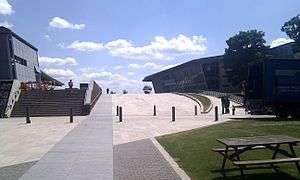Wellcome Genome Campus
The Wellcome Genome Campus is a scientific research campus built in the grounds of Hinxton Hall, Hinxton in Cambridgeshire, England.[2][3][4][5]
 The campus grounds, 2010 | |
| Established | 1993[1] |
|---|---|
Field of research | |
| Staff | c. 1,400 |
| Address | Wellcome Genome Campus, Hinxton, CB10 1SA |
| Location | Hinxton, Cambridgeshire, UK |
| Affiliations | |
| John Sulston | |
| Website | www |
Campus
The Campus is home to some institutes and organisations in genomics and computational biology. The Campus is part of the Wellcome Trust, a global charitable foundation that exists to improve health, and houses the Wellcome Sanger Institute, the European Bioinformatics Institute (EBI), the bioinformatics outstation of the European Molecular Biology Laboratory (EMBL), and a number of biotech companies whose UK offices are located in the BioData Innovation Centre acting as an incubator for businesses of all sizes.
Activities
At the Campus, genome and biodata research takes place. The Campus provides bioinformatics services and delivers training in genomics and biodata to scientists and clinicians.
History
The site hosted the Medical Research Council's Rosalind Franklin Center for Genomics Research[6] until its closure in 2005 and was the location where around one third of the human genome was sequenced.[7]
In addition to the research institutions, there are facilities on the Campus dedicated to training and conferences; these include the former Hinxton Hall buildings.[8][9]
References
- "Sanger Institute history". UK: Sanger Institute. Archived from the original on 7 April 2015. Retrieved 29 February 2016.
- "Wellcome Genome Campus". London: Wellcome Trust. Archived from the original on 18 May 2012.
- Chiang, G. T.; Clapham, P.; Qi, G.; Sale, K.; Coates, G. (2011). "Implementing a genomic data management system using iRODS in the Wellcome Sanger Institute". BMC Bioinformatics. 12: 361. doi:10.1186/1471-2105-12-361. PMC 3228552. PMID 21906284.
- Holroyd, N.; Sanchez-Flores, A. (2012). "Producing parasitic helminth reference and draft genomes at the Wellcome Sanger Institute". Parasite Immunology. 34 (2–3): 100–107. doi:10.1111/j.1365-3024.2011.01311.x. PMID 21707658.
- "Wellcome Trust – Facilities Management". Archived from the original on 18 May 2012.
- Weaver, T.; Maurer, J.; Hayashizaki, Y. (2004). "Opinion: Sharing genomes: An integrated approach to funding, managing and distributing genomic clone resources". Nature Reviews Genetics. 5 (11): 861–866. doi:10.1038/nrg1474. PMID 15520795.
- "The Finished Human Genome – Wellcome to the Genomic Age – Wellcome Sanger Institute". Archived from the original on 18 May 2012.
- Smith), James. "Wellcome Genome Campus Conference Centre – Home page". conferencecentre.wellcomegenomecampus.org. Retrieved 29 July 2016.
- "Courses, Conferences and Public Engagement Director's Office | Sanger Institute". www.sanger.ac.uk. Retrieved 29 July 2016.
